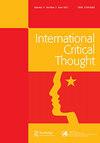Class Root of Police Brutality: The Missing Gap in the Black Lives Matter Movement
IF 0.4
Q4 POLITICAL SCIENCE
引用次数: 0
Abstract
ABSTRACT This paper explores the activism of the Black Lives Matter (BLM) movement and argues that the missing link in the movement is the class question, which has impacted on its tactics, strategies, and modus operandi. Since its emergence, the BLM movement has won some concessions in police reforms, defunding of police, policy changes in use of body camera and greater transparency in policing, yet the problems of racism, police brutality, over-policing, and police killings persist. What seems to be problematic is the narrow understanding of the problems and the cosmetic nature of police reforms that have failed to address the capitalist root of the problem. By sidestepping the class question, the movement has failed to understand that racism, police brutality, and police killings are essential tools used by the ruling class and the state in the American capitalist system to sustain its rules, domination, and control. By taking the class question off the agenda, the engagement of the BLM movement has been reduced to the race question and race consciousness, which led to a failure to unpack racism and policing as class questions and draw the tactics of the movement around the class question. The solution to this impasse is to understand black struggle as a subset of class struggle and prioritise the radicalisation of the black working class as a social base to connect with the black underclass and American working class in general and externalise the issues as generic problems facing Americans. The paper concludes that it is the unity of the American working class that can confront the capitalist underpinning of the problems of racism, police brutality, and extra-judicial police killings in American society.警察暴力的阶级根源:黑人生命至上运动中缺失的差距
ABSTRACT 本文探讨了 "黑人生命至上"(Black Lives Matter,BLM)运动的积极性,并认为该运动缺少的环节是阶级问题,这对其战术、策略和运作方式产生了影响。自出现以来,BLM 运动在警察改革、为警察拨款、使用人体摄影机的政策变化和提高警务透明度等方面赢得了一些让步,但种族主义、警察暴力、过度警务和警察杀人等问题依然存在。问题似乎在于对这些问题的狭隘理解,以及警察改革的表面性,这些改革未能解决资本主义问题的根源。由于回避了阶级问题,这场运动未能理解种族主义、警察暴力和警察杀人是美国资本主义制度中统治阶级和国家用来维持其统治、支配和控制的基本工具。由于将阶级问题排除在议程之外,BLM 运动的参与被简化为种族问题和种族意识,导致无法将种族主义和警务作为阶级问题进行解读,也无法围绕阶级问题制定运动策略。解决这一僵局的办法是将黑人斗争理解为阶级斗争的一个子集,并优先考虑黑人工人阶级的激进化,以此为社会基础,与黑人底层和整个美国工人阶级建立联系,并将这些问题外化为美国人面临的普遍问题。本文的结论是,美国工人阶级的团结才能对抗美国社会中种族主义、警察暴行和法外杀警等问题的资本主义基础。
本文章由计算机程序翻译,如有差异,请以英文原文为准。
求助全文
约1分钟内获得全文
求助全文

 求助内容:
求助内容: 应助结果提醒方式:
应助结果提醒方式:


